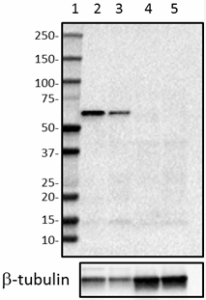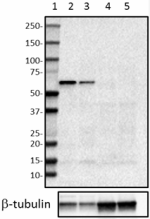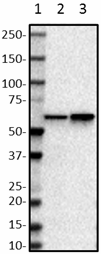- Clone
- P83B5/PAK2 (See other available formats)
- Regulatory Status
- RUO
- Other Names
- p21-activated kinase 2
- Isotype
- Mouse IgG1
- Ave. Rating
- Submit a Review
- Product Citations
- publications

-

Western blot of purified anti-PAK2 antibody (clone P83B5/PAK2). Lane 1: Molecular weight marker; Lane 2: 20 µg of human brain lysate; Lane 3: 20 µg of human brain nuclear lysate; Lane 4: 20 µg of rat brain lysate; Lane 5: 20 µg of mouse brain lysate. The blot was incubated with 2 µg/mL of the primary antibody overnight at 4°C, followed by incubation with HRP-labeled goat anti-mouse IgG (Cat. No. 405306). β-tubulin (Cat. No. 801206) was used as loading control. Enhanced chemiluminescence was used as the detection system. -

Western blot of purified anti-PAK2 antibody (clone P83B5/PAK2). Lane 1: Molecular weight marker; Lane 2: 20 µg of Hela cell lysate; Lane 3: 20 µg of SH-SY5Y cell lysate. The blot was incubated with 2 µg/mL of the primary antibody overnight at 4°C, followed by incubation with HRP-labeled goat anti-mouse IgG (Cat. No. 405306). Enhanced chemiluminescence was used as the detection system.
| Cat # | Size | Price | Save |
|---|---|---|---|
| 853401 | 25 µg | ¥24,640 | |
| 853402 | 100 µg | ¥60,720 |
PAK2 (p21-activated kinase 2) is a serine/threonine protein kinase that plays a role in a variety of different signaling pathways including cytoskeleton regulation, cell motility, cell cycle progression, apoptosis, and proliferation. It acts as the downstream effector of the small GTPases CDC42 and RAC1. PAK2 stimulates cell survival and cell growth, and knockdown of PAK2 induces cell cycle arrest. PAK2 is also implicated in the immune system. Loss of PAK2 results in reduced expression of multiple Treg functional molecules, including Foxp3, CD25, Nrp-1 and CTLA-4, coupled with a loss of Treg suppressive function in vitro and in vivo. The p21-activated kinases (PAKs) are the main effectors for the small Rho GTPases, critically involved in neurodevelopment, plasticity and maturation of the nervous system.
Product DetailsProduct Details
- Verified Reactivity
- Human
- Antibody Type
- Monoclonal
- Host Species
- Mouse
- Immunogen
- Recombinant fragment of human PAK2 (a.a. 4-223) protein.
- Formulation
- Phosphate-buffered solution, pH 7.2, containing 0.09% sodium azide.
- Preparation
- The antibody was purified by affinity chromatography.
- Concentration
- 0.5 mg/mL
- Storage & Handling
- The antibody solution should be stored undiluted between 2°C and 8°C.
- Application
-
WB - Quality tested
- Recommended Usage
-
Each lot of this antibody is quality control tested by Western blotting. For Western blotting, the suggested use of this reagent is 0.5 - 2.0 µg/mL. It is recommended that the reagent be titrated for optimal performance for each application.
- Application Notes
-
This antibody specifically recognizes human PAK2 and does not cross-react with mouse or rat PAK2.
- RRID
-
AB_2734648 (BioLegend Cat. No. 853401)
AB_2734648 (BioLegend Cat. No. 853402)
Antigen Details
- Structure
- PAK2 is a 524 amino acid protein with a molecular mass of 58 kD.
- Distribution
-
Tissue distribution: PAK2 is ubiquitously expressed. Higher expression levels of PAK2 are observed in skeletal muscle, ovary, thymus and spleen.
Cellular distribution: Nucleus. - Function
- PAK2 is a serine/threonine protein kinase that plays a role in a variety of different signaling pathways including cytoskeleton regulation, cell motility, cell cycle progression, apoptosis, and proliferation.
- Interaction
- PAK2 interacts with CDC42/p21, RAC1, and SH3MD4.
- Cell Type
- Embryonic Stem Cells, Mesenchymal Stem Cells
- Biology Area
- Cell Biology, Neurodegeneration, Neuroscience, Protein Trafficking and Clearance, Stem Cells
- Molecular Family
- Enzymes and Regulators, Protein Kinases/Phosphatase
- Antigen References
-
- Fuchsova B, et al. 2016. Neuroscience. 333:331
- O’Hagan KL, et al. 2017. Sci Rep. 7:17097
- Koo KH and Kwon H. 2018. Cell Death Dis. 9:77
- Gene ID
- 5062 View all products for this Gene ID
- UniProt
- View information about PAK2 on UniProt.org
Related Pages & Pathways
Pages
Related FAQs
Other Formats
View All PAK2 Reagents Request Custom Conjugation| Description | Clone | Applications |
|---|---|---|
| Purified anti-PAK2 | P83B5/PAK2 | WB |
Compare Data Across All Formats
This data display is provided for general comparisons between formats.
Your actual data may vary due to variations in samples, target cells, instruments and their settings, staining conditions, and other factors.
If you need assistance with selecting the best format contact our expert technical support team.










Follow Us